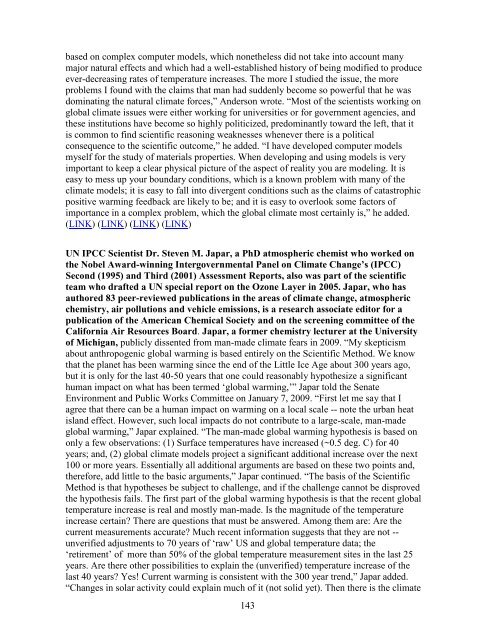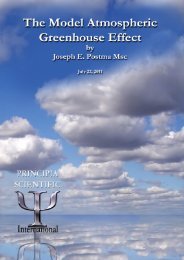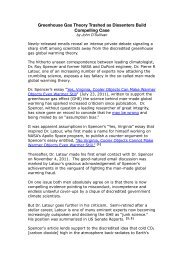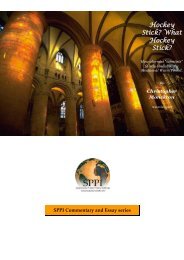Than 1000 International Scientists Dissent Over Man-Made Global ...
Than 1000 International Scientists Dissent Over Man-Made Global ...
Than 1000 International Scientists Dissent Over Man-Made Global ...
You also want an ePaper? Increase the reach of your titles
YUMPU automatically turns print PDFs into web optimized ePapers that Google loves.
ased on complex computer models, which nonetheless did not take into account many<br />
major natural effects and which had a well-established history of being modified to produce<br />
ever-decreasing rates of temperature increases. The more I studied the issue, the more<br />
problems I found with the claims that man had suddenly become so powerful that he was<br />
dominating the natural climate forces,‖ Anderson wrote. ―Most of the scientists working on<br />
global climate issues were either working for universities or for government agencies, and<br />
these institutions have become so highly politicized, predominantly toward the left, that it<br />
is common to find scientific reasoning weaknesses whenever there is a political<br />
consequence to the scientific outcome,‖ he added. ―I have developed computer models<br />
myself for the study of materials properties. When developing and using models is very<br />
important to keep a clear physical picture of the aspect of reality you are modeling. It is<br />
easy to mess up your boundary conditions, which is a known problem with many of the<br />
climate models; it is easy to fall into divergent conditions such as the claims of catastrophic<br />
positive warming feedback are likely to be; and it is easy to overlook some factors of<br />
importance in a complex problem, which the global climate most certainly is,‖ he added.<br />
(LINK) (LINK) (LINK) (LINK)<br />
UN IPCC Scientist Dr. Steven M. Japar, a PhD atmospheric chemist who worked on<br />
the Nobel Award-winning Intergovernmental Panel on Climate Change‟s (IPCC)<br />
Second (1995) and Third (2001) Assessment Reports, also was part of the scientific<br />
team who drafted a UN special report on the Ozone Layer in 2005. Japar, who has<br />
authored 83 peer-reviewed publications in the areas of climate change, atmospheric<br />
chemistry, air pollutions and vehicle emissions, is a research associate editor for a<br />
publication of the American Chemical Society and on the screening committee of the<br />
California Air Resources Board. Japar, a former chemistry lecturer at the University<br />
of Michigan, publicly dissented from man-made climate fears in 2009. ―My skepticism<br />
about anthropogenic global warming is based entirely on the Scientific Method. We know<br />
that the planet has been warming since the end of the Little Ice Age about 300 years ago,<br />
but it is only for the last 40-50 years that one could reasonably hypothesize a significant<br />
human impact on what has been termed ‗global warming,‘‖ Japar told the Senate<br />
Environment and Public Works Committee on January 7, 2009. ―First let me say that I<br />
agree that there can be a human impact on warming on a local scale -- note the urban heat<br />
island effect. However, such local impacts do not contribute to a large-scale, man-made<br />
global warming,‖ Japar explained. ―The man-made global warming hypothesis is based on<br />
only a few observations: (1) Surface temperatures have increased (~0.5 deg. C) for 40<br />
years; and, (2) global climate models project a significant additional increase over the next<br />
100 or more years. Essentially all additional arguments are based on these two points and,<br />
therefore, add little to the basic arguments,‖ Japar continued. ―The basis of the Scientific<br />
Method is that hypotheses be subject to challenge, and if the challenge cannot be disproved<br />
the hypothesis fails. The first part of the global warming hypothesis is that the recent global<br />
temperature increase is real and mostly man-made. Is the magnitude of the temperature<br />
increase certain? There are questions that must be answered. Among them are: Are the<br />
current measurements accurate? Much recent information suggests that they are not --<br />
unverified adjustments to 70 years of ‗raw‘ US and global temperature data; the<br />
‗retirement‘ of more than 50% of the global temperature measurement sites in the last 25<br />
years. Are there other possibilities to explain the (unverified) temperature increase of the<br />
last 40 years? Yes! Current warming is consistent with the 300 year trend,‖ Japar added.<br />
―Changes in solar activity could explain much of it (not solid yet). Then there is the climate<br />
143





